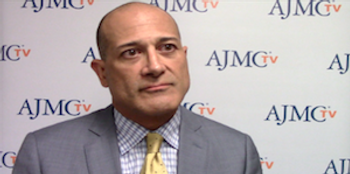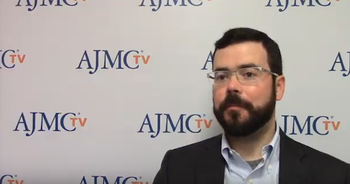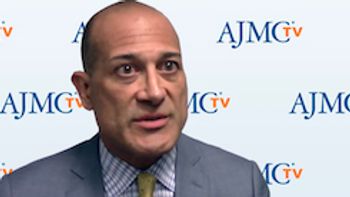
Both large and small causes of burnout need to be addressed, said Barbara Balik, EdD, MS, RN, co-founder of Aefina Partners and senior faculty at the Institute of Healthcare Improvement.

Both large and small causes of burnout need to be addressed, said Barbara Balik, EdD, MS, RN, co-founder of Aefina Partners and senior faculty at the Institute of Healthcare Improvement.

Practice reorganization can worsen clinician burnout, explained Mark Friedberg, MD, MPP, senior natural scientist and director of the Boston office at RAND Corporation, who also discussed his solutions for addressing burnout in the practice.

Addressing health disparities and social determinants of health can be daunting, but there has been a lot of progress, said Shantanu Agrawal, MD, MPhil, CEO and president of National Quality Forum.

The main causes of burnout stem from the system of the practice, not individual behaviors, said Barbara Balik, EdD, MS, RN, co-founder of Aefina Partners and senior faculty at the Institute of Healthcare Improvement.

Bringing together community stakeholders and healthcare leaders can diminish health inequities, said Shantanu Agrawal, MD, MPhil, CEO and president of National Quality Forum.

"If clinicians are burning out, it is unlikely that participation in new payment models will be sustainable," explained Mark Friedberg, MD, MPP, senior natural scientist and director of the Boston office at RAND Corporation.

In the last few years, there’s been a real surge in interest in professional satisfaction in healthcare, according to Mark Friedberg, MD, MPP, senior natural scientist and director of the Boston office at RAND Corporation.

Barbara Balik, EdD, MS, RN, co-founder of Aefina Partners and senior faculty at the Institute of Healthcare Improvement, recognizes the positives and negatives of electronic health records.

Shantanu Agrawal, MD, MPhil, CEO and president of National Quality Forum, recognizes the importance of diminishing health disparities.

Patient-reported outcomes can be critically important, said Justin Bachmann, MD, MPH, FACC, instructor of Medicine and Health Policy at Vanderbilt University Medical Center.

Only 20% of patients who have a heart attack undergo recommended cardiac rehabilitation, so cardiologists are looking at ways to encourage patients to go to rehab, explained Justin Bachmann, MD, MPH, FACC, instructor of Medicine and Health Policy at Vanderbilt University Medical Center.

Justin Bachmann, MD, MPH, FACC, instructor of Medicine and Health Policy at Vanderbilt University Medical Center, discusses how cardiologists incorporate value-based care into their procedures.

Insufficient risk adjustment is a dangerous consequence of incorrectly implemented value-based care models, explained Justin Bachmann, MD, MPH, FACC, instructor of Medicine and Health Policy at Vanderbilt University Medical Center.

Quality measures are 1 tool that can help clinicians uncover health inequities and address social risk factors, explained Shantanu Agrawal, MD, MPhil, CEO and president of National Quality Forum.

There is some controversy in healthcare about whether or not healthcare performance measures should be adjusted for social risk factors, and Shantanu Agrawal, MD, MPhil, CEO and president of (NQF), outlined both sides of the debate.

A demonstration of federally qualified health centers across the country found a decline in multiple measures of professional satisfaction, workplace environment, and workplace culture, said Dr Mark Friedberg, MD, MPP, Senior Natural Scientist, Director, Boston Office, RAND Corporation

Barbara Balik, EdD, MS, RN, co-founder, Aefina Partners; senior faculty, Institute of Healthcare Improvement, explains the importance of addressing clinician burnout and the effects its if isn't addressed.

Clay Alspach, JD, principal, Leavitt Partners, explains how biosimilars will be affected by changes in the FDA under Scott Gottlieb's leadership.

We need to educate both the public and providers on medication-assisted treatment and understand that it is not substituting one drug for another, said Frank James, MD, JD, of American Society of Addiction Medicine.

Workload, work-life integration, and flexibility in daily work are among the factors that can exacerbate or cause clinician burnout, said Barbara Balik, EdD, MS, RN, Co-Founder, Aefina Partners; Senior Faculty, Institute of Healthcare Improvement.

The biggest challenge of implementing behavioral interventions to improve care for patients with cardiovascular disease is reimbursement models, said Justin Bachmann, MD, MPH, FACC, Cardiologist and Clinical Investigator, Instructor of Medicine and Health Policy, Vanderbilt University Medical Center.

When shifting to the value-based care model, organizations should do a few things at a time instead of trying to do too much as once, said Dr Mark Friedberg, MD, MPP, Senior Natural Scientist, Director, Boston Office, RAND Corporation.

It is important to treat addiction as a chronic disease and to address the stigmatization of both the addiction and the treatments we have available to treat it, said Dr Frank James, MD, JD, of American Society of Addiction Medicine.

How the president classifies the opioid epidemic matter doesn't matter as much as attention to it and dedication to responding it, said Frank James, MD, JD, of American Society of Addiction Medicine.

During the final panel at the fall meeting of the ACO & Emerging Healthcare Delivery Coalition® in Nashville, Tennessee, panelists discussed the progress specialties have made in moving to value-based payment models, as well as the challenges facing the industry as a whole. The panel consisted of 3 individuals who provided perspectives from specific specialties, and 1 with an overall policy perspective.

Improving treatment for addiction means first recognizing that addiction is a chronic disease and also understanding that relapse is part of the disease process, explained Frank James, MD, JD, of American Society of Addiction Medicine.

There have been tremendous improvements in healthcare quality and performance measurements, but one area where more needs to be done is incorporating social risk factors into these measurements, said Shantanu Agrawal, MD, CEO and president of National Quality Forum.

At the fall ACO & Emerging Healthcare Delivery Coalition®, Clay Alspach, JD, principal at Leavitt Partners, discussed navigating the current political and payment reform landscape, making sense of the uncertainty, and preparing for the unexpected.

A back to back session and panel at the falls’ ACO & Emerging Healthcare Delivery Coalition focused on the importance of utilizing integrated healthcare to treat individuals with addiction and ensuring physicians are educated on understanding addiction.

Over 2 years, the National Quality Forum (NQF) studied how to best incorporate social risk factors into healthcare measurements and identified the biggest challenges, said Shantanu Agrawal, MD, MPhil, CEO and president of NQF.

259 Prospect Plains Rd, Bldg H
Cranbury, NJ 08512
© 2025 MJH Life Sciences®
All rights reserved.
